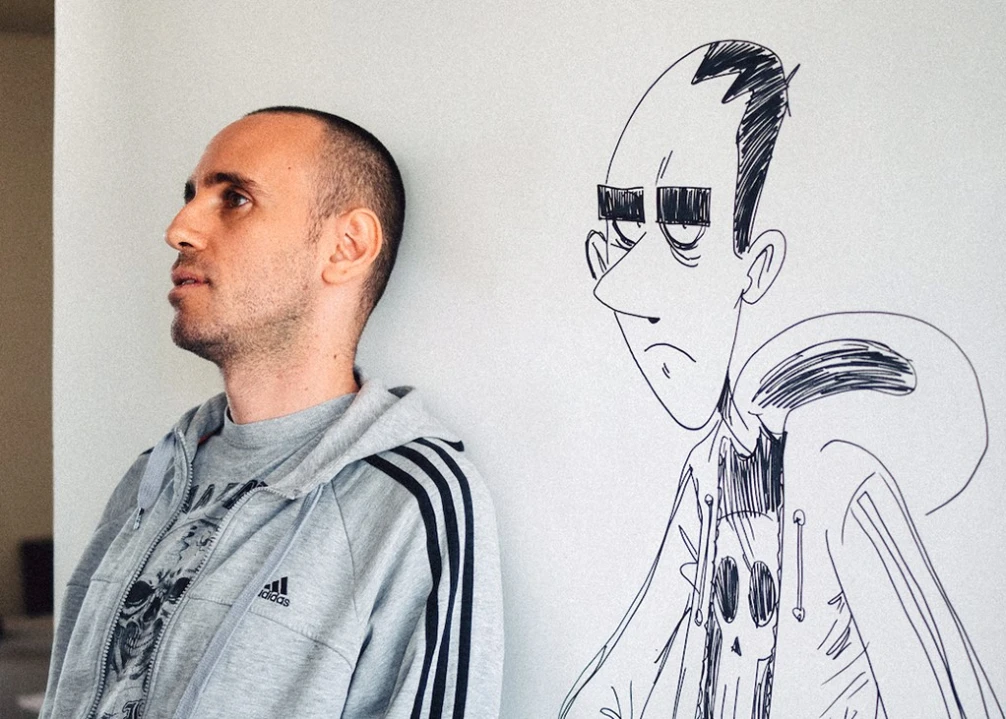Two months ago, “Tear Along the Dotted Line” Netflix comics series by Zerocalcare rapidly became the most-watched TV series in Italy and very popular abroad, for its capacity to excite, laugh and make people think. But who is Zerocalcare? Where do his roots lie?
Michele Rech is not only Italian, he is above all Roman. He speaks, writes and interprets in Roman, with not a few critics for this. Being Roman can mean anything: the city is so large, wide and populated that within it you can create realities even at the antipodes. His neighborhood is Rebibbia, one of the poorest in Rome which takes its name from the biggest Roman prison, by far the most famous building of this area.
Rome is a great modern metropolis where each neighborhood, especially those furthest from the center, has developed as small autonomous microcosms very different from the others. From area to area the culture, the cadence of the Roman accent and sometimes even the mentality changes. The state and institutions have historically been replaced by the autonomy of the community, which often needs to find itself far from the promises of an absent state. Michele Rech has succeeded, through a reworking in a multimedia key of some of his most loved cartoons, to translate all this world from comics to TV series.
Where does the experience of this comic strip start from?
There would be many things to say about the figure of Michele Rech, as many other articles have done about his history, his Italian-French bilingualism, his experience in the bloody clashes of the G8 of Genoa in 2001, his political visions and on his adoption of the straight edge, a subculture of hardcore punk whose adherents refrain from using alcohol, tobacco, and other recreational drugs. It would also be rather obvious, since Michele often uses autobiographical traits, starting with the voice of the armadillo represented by a masterful Valerio Mastrandrea, one of the most important actors of the new Roman wave of Italian cinema, who represents the voice of his conscience; or the reference to the Kurdish flag, which has so enraged Turkey in its desperate cry for justice and freedom.
But instead it is necessary to analyze how the comic is a genre on which Zerocalcare connects two strands.
On the one hand, Italy has a great history of comic book artists, capable of creating characters of the caliber of Lupo Alberto, Tex Willer, Dylan Dog, Diabolik. Over time, this tradition has lost its popularity, but if the numbers went down, the readers of Italian comics who still buy them remain very loyal and respectful of the genre.
On the other hand, there is the genre of political satire comics, which is not generally developed in autonomous magazines like Charlie Hebdo in France, but rather as cartoons in newspapers, which have always been used to express derision or provocation towards politics and society. Today, the political satire cartoon has changed; the most illustrious interpreters of these last decades have been Forattini, Altan, Giannelli, Vauro, Ellekappa, Staino, Vincino and Makkox, with whom in fact Rech has collaborated.
In this context Michele, whose nickname is Zerocalcare, has gone beyond. Not only has he made a Copernican revolution by bringing the phenomenon to be the author and not the character, but he has been able to combine the genre of comics with the culture of reference, exploiting the means that globalized capitalism allowed him: the TV series.
In fact, he lives this success badly, it is denoted also during the series “Tear Along the Dotted Line”, six episodes that all together make no more than a couple of hours and is an absolute masterpiece. Although he enjoys voicing the characters and adding life and music to his drawings, a genre he experimented with on social networks that was immediately successful, he is aware that the very capitalism he criticizes is the means that allows him to travel the world and spread his message.
There is a passage in the series that analyzes precisely this contradictory aspect: in a way that is not at all hypocritical, he realizes that denouncing the unsustainable rhythms of globalized society actually does nothing but feed that same power.
So, without making any spoiler, Zerocalcare's series is not a hymn to revolution, but it becomes a desperate search for community. It is the extreme attempt to re-establish contact and give a voice to the generation born in the 80s that was left behind, in limbo between the economic boom and the technological generation. It is the voice of those who need to feel less alone, surrounded by the love of people, especially in these harsh years of pandemic and solitude due to social media. Zerocalcare tries to bring people closer together to better see that the lives of others are not perfect, and that it is not necessary to carry the weight of the expectations of this society made of biological clocks, disappointments, and the rush to prevaricate.
Tearing along the dotted line of life each one in his own way, with the perfect imperfection of our own choices.




